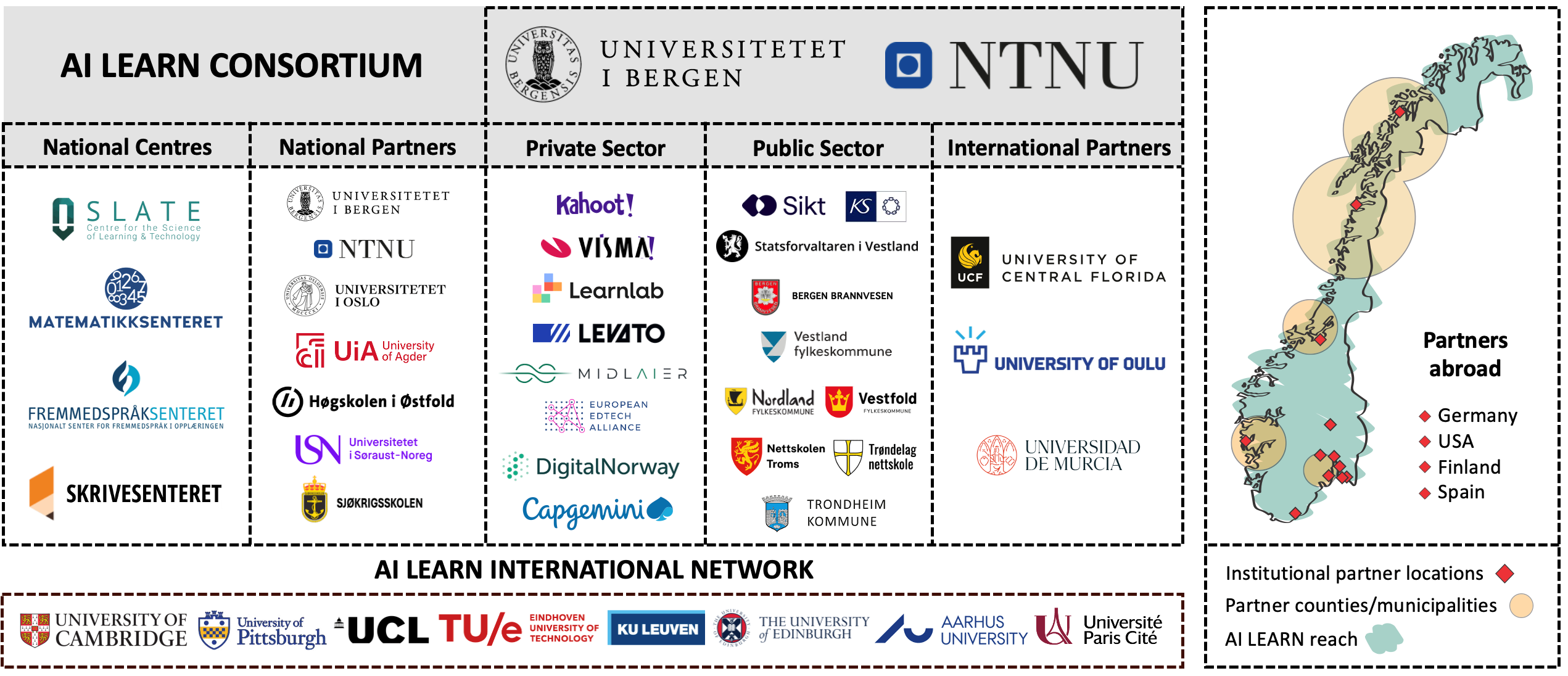June 11, 2025
Hybrid intelligence is the future, according to Professor Barbara Wasson. She will head the new research centre AI LEARN (Artificial Intelligence Centre for the Empowerment of Human Learning), which will conduct research on the interaction between human and artificial intelligence (AI) over the next five years.
– This was some very encouraging news to receive! I believe that AI LEARN will offer important research, development and competence development that Norway needs in the years ahead. Everyone interacts with AI, but we need to figure out how to do this in reliable and responsible ways, says Professor Barbara Wasson. She is the Director of SLATE, the Centre for Learning & Technology, at the Faculty of Psychology.

The government announced today that the centre will receive 200 million kroner in support from the Research Council of Norway, as part of the national initiative on artificial intelligence.
The research centre is led by the University of Bergen (UiB) and the Norwegian University of Science and Technology (NTNU). The centre has 30 partners from academia, the public sector and the business sector – nationally and internationally.
The Largest Grant Ever for UiB Research
– UiB is delighted to receive one of the national AI centres. This shows that SLATE has built itself up over a number of years as the country's leading AI centre in learning technology and the connection between humans and artificial intelligence. I would especially like to congratulate centre Director Barbara Wasson, who will have an important task in the future, but also everyone else who will be part of the centre - both at UiB and at all 30 partners, says UiB Rector Margareth Hagen.
– With AI LEARN, the University of Bergen and its partners will be able to take a leading role in the development of responsible and socially beneficial AI, says Hagen.
The grant of NOK 200 million from the Research Council is the largest single award ever to a research centre at UiB. But with contributions from the centre's partners, the budget is currently at a whopping 360 million.
Will Research Hybrid Intelligence and Human Learning
Hybrid intelligence (HI) combines the strengths of humans and AI. The goal is to create systems where humans and machines collaborate and learn from each other – and achieve better results together than separately. This can contribute to better decision support, automation of routine tasks, innovation and problem solving.
– But it also requires that we manage risks such as loss of human control, weakened expertise and ethical and regulatory challenges, explains Wasson.

The new centre, AI LEARN, will explore how humans and artificial intelligence can collaborate in a responsible and effective way – through what is called hybrid intelligence. This is about humans and AI learning, working and creating together, and that this interaction becomes an important part of society, the education system and working life.
To use AI in a way that strengthens learning, work and democratic participation, we must understand both the opportunities and the risks.
AI LEARN will:
• Investigate how humans – in interaction with AI – learn, work, create and lead.
• Develop responsible and trustworthy AI systems to support productive interactions between humans and AI
• Critically examine the ethical considerations and regulatory issues surrounding human-AI interactions
• Enable the population to encounter AI with knowledge, critical reflection and ethical awareness when interacting with AI in education, work and civic participation
Knowledge for Education, Work and Democracy
The centre will start in December 2025, and it could have a major impact on the use of artificial intelligence in several important areas of society.
– AI is rapidly changing how we learn, work and participate in democracy. AI LEARN will ensure that this development takes place in line with Nordic values, such as trust, inclusion and privacy, says Wasson.
AI LEARN will contribute to the transformation of education and work, through research on how AI can support continuing and further education. This will be done through the education of researchers and professionals with expertise in learning technology and artificial intelligence for academia and business. The centre will develop frameworks and guidelines for the safe and fair use of AI in learning contexts, which may be important in the face of new EU regulations and risks associated with the use of AI systems.
Professors Malgorzata Cyndecka and Jan-Ove Færstad from the Faculty of Law at UiB will be important contributors to AI LEARN. Cyndecka will lead the work on governance, ethics and regulation together with Wasson. Færstad will look at the strengths and limitations of AI when it comes to handling complex legal reasoning, and how this is reflected in students' reasoning on exams.

About the Centre Leaders
The centre's leader, Barbara Wasson, is professor and director at SLATE, the Centre for the Science of Learning & Technology at the Faculty of Psychology, UiB.
Deputy head Michalis Giannakos is professor of interaction design and learning technology at the Faculty of Information Technology and Electrical Engineering at NTNU.
The AI Billion
AI LEARN will be one of six national AI centres that the Research Council of Norway will fund over the next five years.
Researchers from UiB are also partners in two of the other centres, The Norwegian Centre for Trustworthy AI and the Centre for AI & Creativity, both of which are led by the University of Oslo.
The centres will conduct research into how artificial intelligence affects society, develop technology, and strengthen innovation and value creation in business and the public sector, according to a press release from the Research Council.
The AI LEARN research centre will educate 16 PhD candidates at UiB and NTNU.